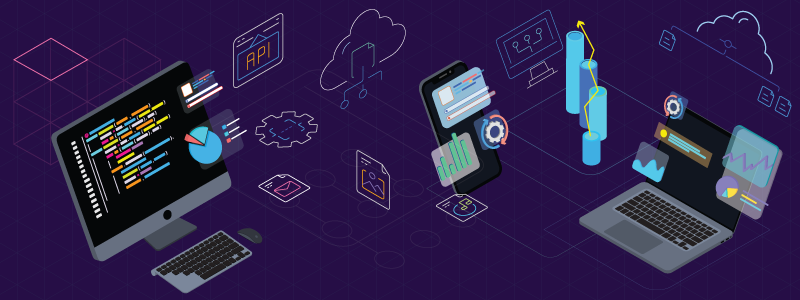By Debbie Rose and Madeline Zick
Let’s begin with a riddle. What do mobile apps, poetry, photographs, movies, books, and sculptures have in common? Answer: they are all eligible for copyright protection! The U.S. Copyright Act offers creators protection for original works of authorship, which according to the U.S. Copyright Office website may include “literary, dramatic, musical, and artistic works, such as poetry, novels, movies, songs, computer software, and architecture.”
Copyright protections also give creators control over who can use and access their works. But do software developers actually register their works and use the resources of the Copyright Office as part of their business development? The answer for thousands of small software companies across the United States is likely no, despite the ability it gives them to sue infringers. Some developers cite a lack of awareness that these services are even available as a reason they do not register. Others state the complexity and time needed to complete the registration is a barrier for use.
However, this could change as the Copyright Office embarks on a modernization process and Congress considers proposals that would update policies and procedures to greatly benefit small business copyright owners, like many mobile app developers.
Recently, ACT | The App Association hosted a briefing for congressional staff in cooperation with the Congressional Intellectual Property Promotion and Piracy Prevention Caucus titled “Apps and Copyright: To Register or Not to Register?” The panelists discussed what benefits copyright law provides to the app ecosystem as well as initiatives to modernize the registration process and update the law—all to provide greater options for small businesses to take legal action against infringers.
Why Register a Copyright Claim?
It helps fight against infringement. The panel explained the basics of copyright registration and how copyright is different from other kinds of intellectual property (IP). Keith Kupferschmid, president and chief executive officer at the Copyright Alliance, discussed how in order to get a patent or trademark, an inventor must first get their application approved by the U.S. Patent and Trademark Office to secure their IP rights. The beauty of copyright is that a work is considered copyrighted from the moment it is created. Robert Kasunic, associate register of copyrights and director of registration policy and practice at the U.S. Copyright Office, added that compared to other kinds of IP, copyright registration is a good protection mechanism because it creates a presumption of a valid copyright claim that can be enforced. He noted that registration increases the effectiveness of cease and desist or notice and takedown letters.
Applying isn’t too hard.An application to register a work, even software, isn’t as hard as most developers might think. Kasunic explained that aside from a small fee, applications to register a work must include a copy of that work. For software, 50 pages of source code are required. And, when it comes to updates, the original work is still protected. Another key tidbit is that applying for the registration itself is not enough for a work to be considered registered: the Office itself must either accept or refuse the application after going through a review process.
Need to register in order to sue for infringement. Kupferschmid explained that the major benefits of registration have to do with litigation. However, small content creators or small business app developers may not register due to the perceived high costs of federal litigation.
All that said, software developers don’t seem to know how to unlock the full benefits of copyright, as many haven’t registered, let alone visited the Copyright Office website. To demonstrate this, Sebastian Holst, executive vice president and chief strategy officer of App Association member company PreEmptive Solutions, sent a survey on developer copyright practices to 1,000 fellow developers. Nonewho took the survey indicated that they had registered their software, while 38 percent of those who took the survey had never been on the U.S. Copyright Office website. Those who added comments stated that the cost, complexity, and unknown value meant that applying to register their app would be a distraction to the business.
So, now what?
Modernizing the Copyright Office and Updating the Law
Part of the copyright registration equation is modernizing the system we have. The U.S. Copyright Office has undertaken an office-wide modernization project. Kasunic reported that the project is focused on improving the registration process by making the online system more user-friendly, improving communication options for applicants, and making copyright information less complex. Currently, 60 percent of the 500,000 yearly applications come through their online system. The Copyright Office has a page dedicated to the modernization initiative on its website.
Revisions to the Copyright Act could also help small copyright owners protect their work. The Copyright Alternative in Small-Claims Enforcement (CASE) Act of 2019 (H.R. 2426and S. 1273) is a bipartisan bill that has been introduced in both the House and Senate. The CASE Act will provide a user-friendly resolution process via a small claims board that allows for remote participation and up to $30,000 in damages for infringement and misrepresentation claims. This will significantly increase the viable options for app developers to enforce their rights.
These changes reflect the realities of the 21st-century digital economy and soon the answer may be yes instead of no when app developers consider whether to register their works with the U.S. Copyright Office. Holst confirmed developers responding to his survey indicated that they would definitely consider registering if the process were easier and real benefits more tangible. The App Association strongly supports the CASE Act and looks forward to working with the U.S. Copyright Office on modernizing its process to ensure app developer interests are represented. These important efforts stand to make a significant impact on the app economy.
